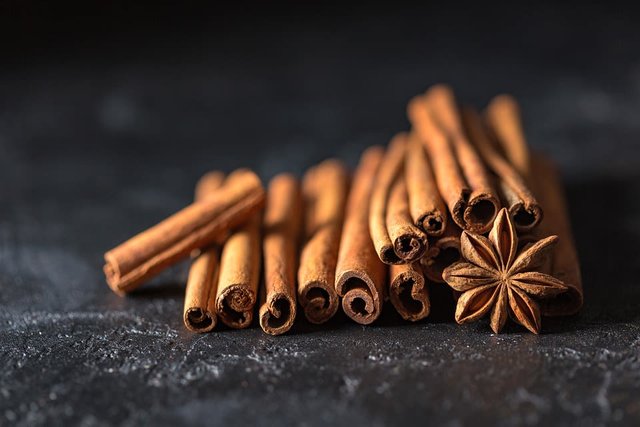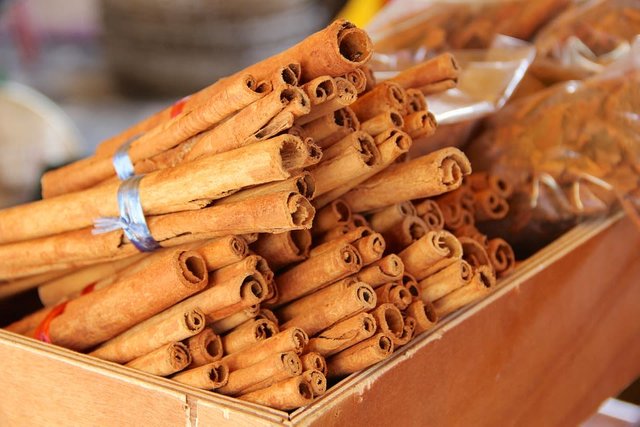Cinnamon's story and therapeutical effects
Cinnamon is a spice that has been used for thousands of years. It comes from the bark of a tree (cinnamomum verum) that can grow up to 12 meters high, but you won’t probably ever see one that tall because they are generally kept as bushes up to 3 meters high for practical reasons.

The name Cinnamon derives from the arabic/hebraic term amomon, which means fragrant plant, in Italy we call it “cannella” because it has a tubular shape, like a cannon.
More than for its therapeutical uses, cinnamon was probably most known for being really expensive. For the romans, Cinnamon was more expensive than silver, and jokingly they use to say that cinnamon only grows in marshes protected by giant bats and that merchants were placing these monsters there to keep the price high.
Jokes aside, trading Cinnamon was a serious business until few centuries ago. The Dutch for instance, were willing to resort to any means to keep the monopoly of cinnamon trade, from conquering the island of Ceylon, to bribing indian kings to destroy all the sources of cinnamon to keep their prices high.

Let’s see why people were willing to pay such high price for cinnamon and its therapeutic uses.
The bark of Cinnamomum verum contains cinnamaldehyde while the leaves are rich in Eugenol, which has anesthetic proprieties.
In the past, it was mainly used for food flavoring and as a digestive tonic. However, Cinnamon was recently found to be a potent fungicide. It was tested to treat oral candida in patients with HIV because their immune system is weak, and it was found to be quite effective in reducing the infection. Probably the most interesting molecule in the Cinnamon is cinnamaldehyde because it may possibly be a natural antidiabetic agent.
There are more than 400 known plants to have glucose-lowering effects, however, Cinnamon is probably the only one that we know of that can have the dual benefit of hypoglycemic and hypolipidemic effects.
Once metabolized, the cinnamaldehyde is converted to cinnamic acid in the liver. This molecule can increase the effects of insulin and also improve the ability of cells to metabolize fats. Studies conducted in diabetic rats revealed that administration of cinnamaldehyde had the same glucose-lowering effects of glibencamide, a commonly used drug, without having the same side-effects. Moreover, rats that received cinnamaldehyde also lost weight.
That sounds great, so why aren’t we using Cinnamon to treat diabetic people? Well, its effects have been only proven in diabetic rats, to my knowledge that are no human studies that prove the efficacy of Cinnamon as an antidiabetic. The only study in humans that I know of is the study that proves the fungicidal effects on HIV-infected patients.
Cinnamon was also traditionally used to treat loss of apetite, upset stomach, as tea for common colds and to treat flatulence.
Are there any side-effects to Cinnamon?
It was found that for some people it can cause skin allergy if used in massage oils also Cinnamon could interfere with the metabolism of different drugs. For example, it contains coumarin which interferes with warfarin (a common anticoagulant). So if you take this drug and you also use plenty of cinnamon please inform your doctor because it could mess up the doses and cause bleeding. Also, pregnant women may want to keep consumption of cinnamon low.
*This post has also been published in Narrative after 7 days:
https://www.narrative.org/post/cinnamon-s-story-and-therapeutical-effects
References:
- https://www.thespruceeats.com/history-of-cinnamon-1807584
- Herbal medicine by Steven Karch
- Nursing Herbal Medicine handbook
- https://www.sciencedirect.com/science/article/pii/S0944711306001772
Fascinating. I love cinnamon. Stopped eating it a few years ago, I don't remember why. Seems like it might be a good condiment, used in moderation (everything, always in moderation 🙂) Since it is processed in the liver, can it accumulate, as fat soluble Vitamin A an D, may? I know too much of either vitamin may damage the liver.
I looked up (can't help myself--I'm sorry) a study--on humans--and found this, which seems to confirm the beneficial effects of cinnamon, although the authors caution that more studies are needed to confirm and refine the findings.
A wonderful article--thank you. May actually change behavior.
I am glad you appreciated the article. I think any food, plant or substance can become a poison if taken at the wrong doses..there are plants that literally have opposite effects if taken at low or high doses..so it's always best to be careful and never exaggerate with consumption. But I was pleased to see that cinnamon seems to be a very useful spice
Cinnamon on the shopping list, for sure :)
Hello @aboutcoolscience :)
It is nice to read your work again (it has been a while!). It was only last Christmas while looking for apple + cinnamon recipes that I got a glimpse of this spice's antidiabetic properties. Like this, from your post, I found most interesting that such effects have only been seen in rats :) Goodness me, some bloggers out there really get carried away!
The background history of it it's also quite fascinating! To think one day cinnamon was more valuable than silver... I am always interested in learning about such things. Finally, in Portuguese (and Spanish) cinnamon is also called canela. But, I suspect you already knew that!
I wish you a wonderful day.
All the best to you,
Abigail
Ciao Abi! it's been a while!Thank you for stopping by.. Yes, Cinnamon seems quite interesting, especially since we may use it already without knowing the possible benefits we may be getting from it. I love history and it's always interesting to see what people used to do in the past! What's your favourite spice?
Uhhhh ... thank you for asking me this question! 😃 And please allow me to be long-winded 😂 (you asked!).
I developed an interest in spices about 10 years ago when I began to make home made Indian Curries. I got to a point where I even made my own garam masala I know... I know ... 😎 So, I tend to go through phases: the cumin phase, the cinammon phase and so on ... Currently, I am on the tumeric phase. Which I also like to mix in my morning natural yogurt. Yum! Yum!
This is all quite interesting, I'll make sure to investigate this further and use it in my practice, thanks for sharing!
Posted using Partiko Android
This post has been voted on by the SteemSTEM curation team and voting trail. It is elligible for support from @utopian-io.
If you appreciate the work we are doing, then consider supporting our witness stem.witness. Additional witness support to the utopian-io witness would be appreciated as well.
For additional information please join us on the SteemSTEM discord and to get to know the rest of the community!
Thanks for having added @steemstem as a beneficiary to your post. This granted you a stronger support from SteemSTEM.
Thanks for having used the steemstem.io app. You got a stronger support!
Hi @aboutcoolscience!
Your post was upvoted by @steem-ua, new Steem dApp, using UserAuthority for algorithmic post curation!
Your UA account score is currently 4.697 which ranks you at #1651 across all Steem accounts.
Your rank has dropped 1390 places in the last three days (old rank 261).
In our last Algorithmic Curation Round, consisting of 144 contributions, your post is ranked at #114.
Evaluation of your UA score:
Feel free to join our @steem-ua Discord server
Hi @aboutcoolscience!
Your post was upvoted by Utopian.io in cooperation with @steemstem - supporting knowledge, innovation and technological advancement on the Steem Blockchain.
Contribute to Open Source with utopian.io
Learn how to contribute on our website and join the new open source economy.
Want to chat? Join the Utopian Community on Discord https://discord.gg/h52nFrV
@aboutcoolscience You have received a 100% upvote from @intro.bot because this post did not use any bidbots and you have not used bidbots in the last 30 days!
Upvoting this comment will help keep this service running.